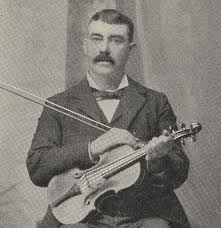Annotation:Pleasures of Hope (1)
X:1 T:Pleasures of Hope [1] L:1/8 M:C| R:Hornpipe S:O’Neill – Dance Music of Ireland: 1001 Gems (1907), No. 864 Z:AK/Fiddler’s Companion K:D (3ABc|d>AF>A B>GE>G|(3FED F>A d>cB>A|E>ee>f (3gfe f>d| e>cA>B A>GF>E|F>Ad>d d>AF>D|E>ee>f (3gfe c>A|d>fa>f b>ge>c|d2 {e}d>c d2:| |:(3ABc|d>fa>f b>ge>c|d>fa>f g>ec>A|d>fa>f (3gfe f>d|(3BBB B>A B>dA>G| F>Ad>d d>AF>D|E>ee>f (3gfe c>A|d>fa>f b>ge>c|d2 {e}d>c d2:|]
PLEASURES OF HOPE ("Taitneam an dotcuis," "Suáilcí an dóchais" or "Aoibneasa an docais"). Irish, Hornpipe (whole time). D Major. Standard tuning (fiddle). One part (Williamson): AABB (Deloughery, Mulvihill, O'Neill): AA’BB’ (Harker/Rafferty). "The Pleasures of Hope" was the title of a didactic poem in heroic couplets written in 1799 by Scottish poet Thomas Campbell [1] (1777-1844), which, among other things, championed the cause of Poles.

Joyce's "Cordick's Hornpipe" is very close to O'Farrell's tune, but without the distinctive 'B' notes in bar four of the second part. Another variant is "Burn's Irish Hornpipe" in Ryan's Mammoth Collection (1883, p. 145)"[1].

